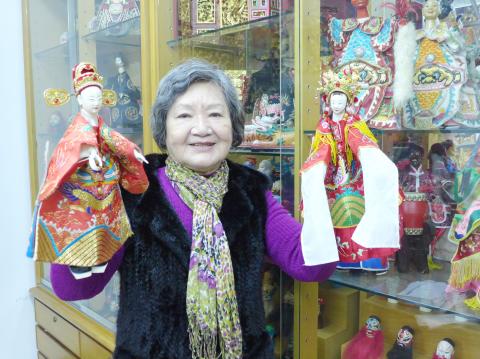Chiang Tse-mei (江賜美) has become one of the most renowned female performers in the puppet theater tradition known as budaixi (布袋戲) through her keen sense of observation and diligent practice, despite not having been officially apprenticed by any known masters or part of a renowned troupe.
Chiang said that her great-grandfather, who was a practitioner of divination, once predicted she would do a job that was done more by men than women, but if she endured the hardships in the beginning, then she would go far in the industry.
Her father worked in a puppetry troupe as a musician and because of the demand for puppetry — often to the level where the troupe was short of staff, especially on big occasions, such as Matsu’s (媽祖) birthday — he would sometimes take her along as an pair of extra hands.

Photo: Lee Ya-wen, Taipei Times
The experience started Chiang in the trade.
“I was not willing at first; my dad had to force me to go along,” Chiang said, adding that her father’s serious nature left no room for argument.
Chiang said her reticence had been fed by comments from older people who said puppetry was a hard business, but she was forced onto the path.
Despite reservations about the job, Chiang said she did not find anything too difficult and she would remember everything she had to do the moment she took up the puppets.
Quite unexpectedly, the appearance of a small girl in the troupe, usually full of men, drew the attention of many in the audience. Since her first appearance with the Ji Yi Yuan troupe under Chou Kun-jung (周坤榮), a renowned puppetry troupe from Nantou County, Chiang’s name spread.
By the time she was 16 years old, Chiang had made enough of a name for herself that her father applied for the establishment of a puppetry troupe in her name to take advantage of the novelty of a group with a female leader.
When Chiang turned 35, she uprooted her family and relocated to northern Taiwan, along with a large number of people in the troupe.
“I did not want to get into puppetry and used to go to performances in tears during my childhood. I never thought I would stay in the troupe for so long. I have even raised six children with income from the troupe,” Chiang said.
“Even after the troupe’s relocation, we still had good business,” she said.
After a performance at Houtong Train Station in Ruifang District (瑞芳), New Taipei City, Chiang said she woke up in the middle of the night and saw a long line of bobbing torches moving along a mountain path.
“Asking around the next day, we found out that it was people returning home after walking all the way to Houtong to watch the show,” Chiang said.
The trade was hard, and perhaps the hardest moment in all her years was performing close to the times when her children were due, Chiang said, adding that the business held a charm that made it difficult to leave.

A strong continental cold air mass is to bring pollutants to Taiwan from tomorrow, the Ministry of Environment said today, as it issued an “orange” air quality alert for most of the country. All of Taiwan except for Hualien and Taitung counties is to be under an “orange” air quality alert tomorrow, indicating air quality that is unhealthy for sensitive groups. In China, areas from Shandong to Shanghai have been enveloped in haze since Saturday, the ministry said in a news release. Yesterday, hourly concentrations of PM2.5 in these areas ranged from 65 to 160 micrograms per cubic meter (mg/m³), and pollutants were

Taiwan’s armed forces have established response protocols for a wide range of sudden contingencies, including the “Wan Chun Plan” to protect the head of state, the Ministry of Defense (MND) said today. After US President Donald Trump on Saturday launched a series of airstrikes in Venezuela and kidnapped Venezuelan President Nicolas Maduro, concerns have been raised as to whether China would launch a similar “decapitation strike” on Taiwan. The armed forces regularly coordinate with relevant agencies and practice drills to ensure preparedness for a wide range of scenarios, Vice Minister of National Defense Hsu Szu-chien (徐斯儉) told reporters before a

EVA Airways on Saturday said that it had suspended a pilot and opened an investigation after he allegedly lost his temper and punched the first officer several times as their plane was taxiing before takeoff at Los Angeles International Airport. According to a report published on Thursday by The Reporter, the incident occurred after the flight’s Malaysian first officer tried to warn the Taiwanese pilot, surnamed Wen (文), that he was taxiing faster than the speed limit of 30 knots (55.6kph). After alerting the pilot several times without response, the first officer manually applied the brakes in accordance with standard operating

NOT AN OPENING: Trump’s violation of international law does not affect China’s consideration in attacking Taiwan; Beijing lacks capability, not precedent, an official said Taiwanese officials see the US’ capture of the president of Venezuela as a powerful deterrent to Beijing’s aggression and a timely reminder of the US’ ability to defeat militaries equipped with Chinese-made weapons. The strikes that toppled Venezuelan President Nicolas Maduro signaled to authoritarian leaders, including Chinese President Xi Jinping (習近平), US President Donald Trump’s willingness to use military might for international affairs core to US interests, one senior official in Taipei’s security circle said. That reassured Taiwan, the person said. Taipei has also dismissed the idea that Trump’s apparent violation of international law could embolden Beijing, said the official, who was not